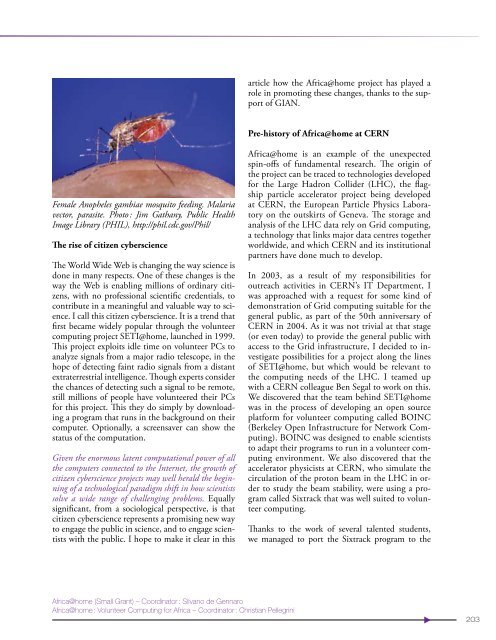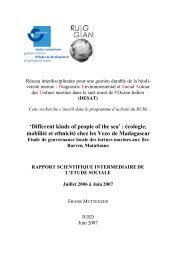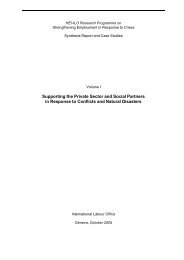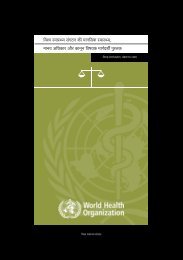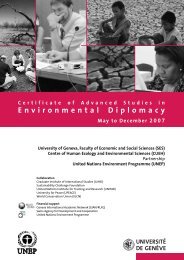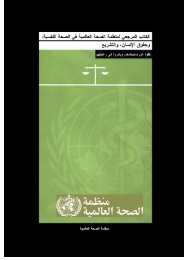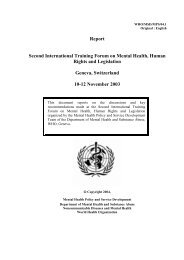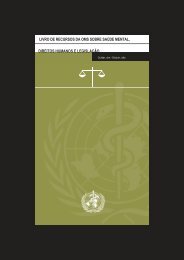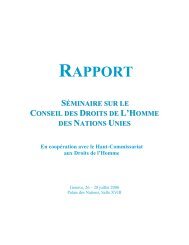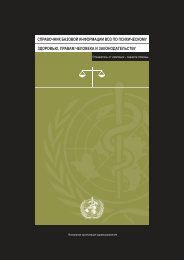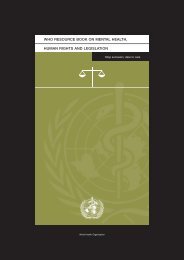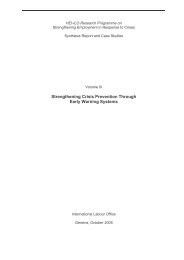Les liaisons fructueuses - RUIG-GIAN
Les liaisons fructueuses - RUIG-GIAN
Les liaisons fructueuses - RUIG-GIAN
Create successful ePaper yourself
Turn your PDF publications into a flip-book with our unique Google optimized e-Paper software.
article how the Africa@home project has played a<br />
role in promoting these changes, thanks to the support<br />
of <strong>GIAN</strong>.<br />
Pre-history of Africa@home at CERN<br />
Female Anopheles gambiae mosquito feeding. Malaria<br />
vector, parasite. Photo : Jim Gathany, Public Health<br />
Image Library (PHIL), http://phil.cdc.gov/Phil/<br />
The rise of citizen cyberscience<br />
The World Wide Web is changing the way science is<br />
done in many respects. One of these changes is the<br />
way the Web is enabling millions of ordinary citizens,<br />
with no professional scientific credentials, to<br />
contribute in a meaningful and valuable way to science.<br />
I call this citizen cyberscience. It is a trend that<br />
first became widely popular through the volunteer<br />
computing project SETI@home, launched in 1999.<br />
This project exploits idle time on volunteer PCs to<br />
analyze signals from a major radio telescope, in the<br />
hope of detecting faint radio signals from a distant<br />
extraterrestrial intelligence. Though experts consider<br />
the chances of detecting such a signal to be remote,<br />
still millions of people have volunteered their PCs<br />
for this project. This they do simply by downloading<br />
a program that runs in the background on their<br />
computer. Optionally, a screensaver can show the<br />
status of the computation.<br />
Given the enormous latent computational power of all<br />
the computers connected to the Internet, the growth of<br />
citizen cyberscience projects may well herald the beginning<br />
of a technological paradigm shift in how scientists<br />
solve a wide range of challenging problems. Equally<br />
significant, from a sociological perspective, is that<br />
citizen cyberscience represents a promising new way<br />
to engage the public in science, and to engage scientists<br />
with the public. I hope to make it clear in this<br />
Africa@home is an example of the unexpected<br />
spin-offs of fundamental research. The origin of<br />
the project can be traced to technologies developed<br />
for the Large Hadron Collider (LHC), the flagship<br />
particle accelerator project being developed<br />
at CERN, the European Particle Physics Laboratory<br />
on the outskirts of Geneva. The storage and<br />
analysis of the LHC data rely on Grid computing,<br />
a technology that links major data centres together<br />
worldwide, and which CERN and its institutional<br />
partners have done much to develop.<br />
In 2003, as a result of my responsibilities for<br />
outreach activities in CERN’s IT Department, I<br />
was approached with a request for some kind of<br />
demonstration of Grid computing suitable for the<br />
general public, as part of the 50th anniversary of<br />
CERN in 2004. As it was not trivial at that stage<br />
(or even today) to provide the general public with<br />
access to the Grid infrastructure, I decided to investigate<br />
possibilities for a project along the lines<br />
of SETI@home, but which would be relevant to<br />
the computing needs of the LHC. I teamed up<br />
with a CERN colleague Ben Segal to work on this.<br />
We discovered that the team behind SETI@home<br />
was in the process of developing an open source<br />
platform for volunteer computing called BOINC<br />
(Berkeley Open Infrastructure for Network Computing).<br />
BOINC was designed to enable scientists<br />
to adapt their programs to run in a volunteer computing<br />
environment. We also discovered that the<br />
accelerator physicists at CERN, who simulate the<br />
circulation of the proton beam in the LHC in order<br />
to study the beam stability, were using a program<br />
called Sixtrack that was well suited to volunteer<br />
computing.<br />
Thanks to the work of several talented students,<br />
we managed to port the Sixtrack program to the<br />
Africa@home (Small Grant) – Coordinator : Silvano de Gennaro<br />
Africa@home : Volunteer Computing for Africa – Coordinator : Christian Pellegrini<br />
203


